Celebration and catastrophe should never share the same stage. And yet, that is precisely what unfolded in Bengaluru. The Bloody Trophy is not just a metaphor—it is the tragic reality of a moment that should have brought joy, but instead left a trail of irreversible grief. As Indian cricket fans, it is time to reflect, not just react.

The recent stampede that followed Royal Challengers Bengaluru’s long-awaited IPL victory turned triumph into tragedy. A celebration turned into mourning. Eleven lives lost. Hundreds injured. Families shattered. A young girl, barely 13, travelled from Andhra Pradesh just to catch a glimpse of her hero—only to return home in silence, in a coffin.
Bloody Trophy—a phrase that defines this disaster. It encapsulates the blood spilled for a moment of glory.
Responsibility Is Not Optional
Everyone is responsible. From fans to administrators. From cricketers to political figures. It’s time we stop shrugging our shoulders and start pointing fingers where they deserve to be pointed. Yes, the government, yes, the police, but also the event organizers, the franchise, and even the fans. Especially the fans who broke barricades, climbed poles, ignored warnings, and stormed the gates like ration queues during a famine.

The Bloody Trophy now questions the cost of celebration. What should have been a proud moment after 18 years of struggle for RCB, became a stain on the league’s legacy. What failed? Crowd management? Yes. But deeper still—it was the collective failure of empathy, responsibility, and foresight.
The Moral Failure of Management
Let us be clear—RCB players didn’t manage the crowd. That wasn’t their job. But when tragedy struck outside, the party inside went on uninterrupted. That is the moment the Bloody Trophy was born. That moral failure—continuing the festivities when bodies lay outside—will haunt any conscience that still functions.
Management knew. Police had warned. The route was congested. Bengaluru is notorious for its traffic, yet no lessons were learnt. The police had denied permission for an open-top parade. Still, it went ahead. People were lured with the idea of “free entry”—a term that is essentially a stampede invitation when 3 lakh people are involved.
Learn From Mumbai, Not Repeat Bengaluru
We celebrated the 2024 T20 World Cup in Mumbai. Same cricketing frenzy. Same level of fanfare. Yet, no stampede. Why? Because things were managed. Because someone somewhere used foresight.

This wasn’t the first such event, but its consequences have been the most tragic in recent memory. The difference lies in how it was done. In Mumbai, there was coordination. In Bengaluru, chaos.
Is ₹10 Lakh Justice?
RCB has announced financial support—₹10 lakh each to the families of the deceased. A noble gesture, perhaps. But what does it buy? A child? A parent? A sibling? Can the Bloody Trophy be cleaned with compensation? Can a dead dream be revived with currency notes?
One father reportedly begged for his son’s body—whole and untouched. Not dissected. That is what this celebration has done to people. And no amount of story posts, tweets, or thumbnail videos will heal such wounds. Nor will the trend of justice last beyond the last candle of the vigil. That’s the brutal truth.
The Fans Must Also Wake Up
We, the people, are not guiltless. The stampede didn’t happen in a vacuum. It happened because many of us decided we had to be the first to get in. Because we forgot that in being fans, we are still citizens—bound by law, responsibility, and basic humanity.
Prime Minister won’t put ration in your house. Neither will your Chief Minister. Responsibility is personal. Nobody forced you to climb that gate or push through the crowd like animals. When we behave like mobs, we lose the right to be called a civilized society.
FIR Is Not Closure

An FIR has now been lodged. RCB event managers. Karnataka State Cricket Association’s admin. All named. Will it bring justice? That remains a mystery. India has long learnt to sit for inquiries, but we’ve rarely seen any stand up with results. Justice, like those eleven lives, may also get trampled under bureaucracy.
One Image. One Girl. One Nation’s Shame.
That one image of the 13-year-old girl from Andhra Pradesh who suffocated near the press gate is enough to stop defending anyone involved. No cricketer, no minister, no organizer is above her death. She came for love, and the system gave her death. If that doesn’t make you stop and think, nothing ever will.
Let’s Be Humans Before Fans
Before blaming leaders or players, we must change as people. As long as we behave like stampeding cattle, we’ll continue to bury children after every celebration. That’s the real cost of the Bloody Trophy—a trophy soaked not in champagne, but in blood.
This is a call—not just for accountability, but for evolution. Let’s not wait for another Bloody Trophy to remind us that no celebration is worth a single human life.

Incident Reported by National Media
In the wake of the Bloody Trophy tragedy, mainstream media has provided chilling insight into what went wrong. The Hindu’s live coverage reported how the stampede unfolded around the iconic Chinnaswamy Stadium and traced the series of missteps that led to the catastrophe. NDTV later confirmed that multiple arrests—including top RCB officials—were made, indicating the serious lapses in planning and protocol. Hindustan Times offered a deep dive into the root causes, including crowd control failures and communication breakdowns. These reports are not just news—they are testimonies of negligence that demand national accountability.
Want to learn more about us? Visit our About us page.
